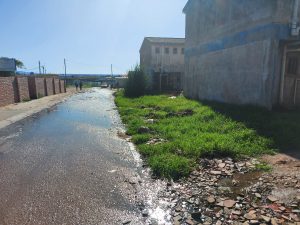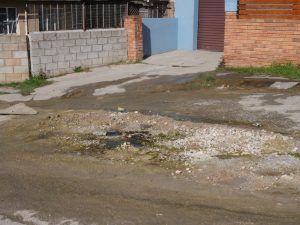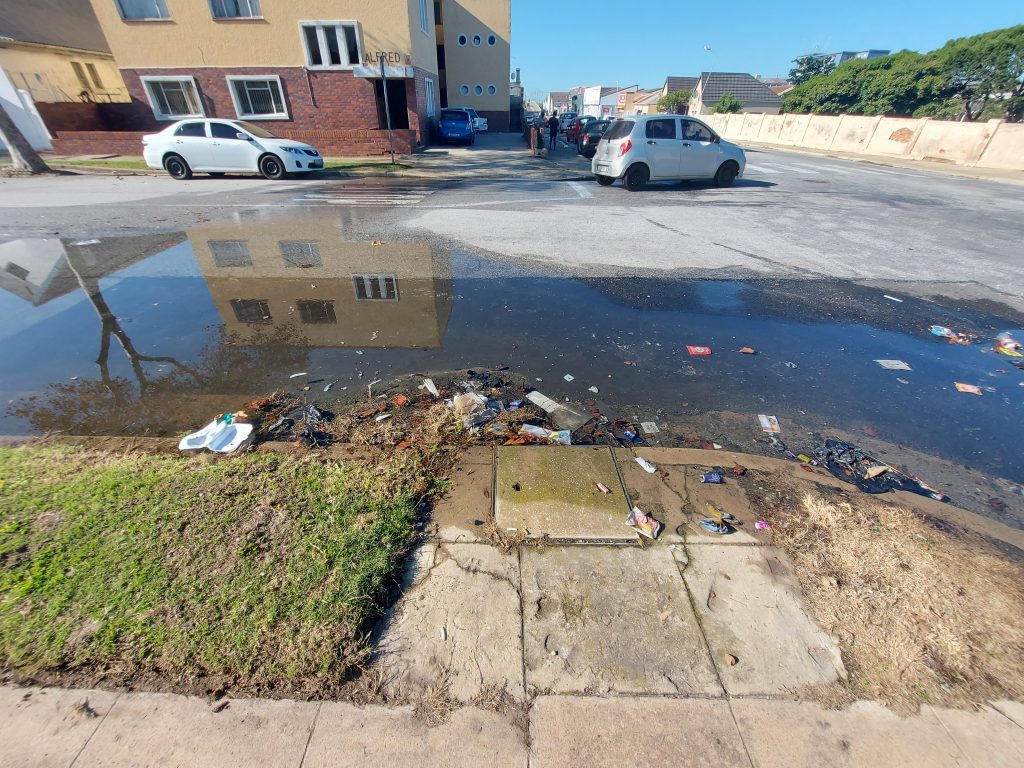The Nelson Mandela Bay municipality has fast tracked the city’s day zero, by failing to ensure that water is not lost to thousands of leaks in the metro, Amnesty International South Africa said.
A team from Amnesty International South Africa visited a number of areas in Nelson Mandela Bay, such as Gqeberha, Kariega (Uitenhage), Bethelsdorp and Kwazakhele last week.
The metro is facing a severe water shortage and is facing ‘day zero’, in less than a week. On 13 June 2022, the metro experienced its first dam failure with the Impofu Dam running dry. The municipality said the Churchill Dam is expected to run dry in 11 days.
Despite the city facing a water crisis, Nelson Mandela Bay loses about 29% of its water supply to leaks. This was revealed in the municipality’s draft annual report 2020/21.
“It is disgraceful that the municipality has been unable to deal with the issue of water leaks, knowing that the metro is in the midst of a water crisis. The government is obliged to guarantee that sufficient resources are allocated and protected in any situation, to ensure that all human rights are upheld, and this includes the right to water,” Amnesty International South Africa Executive Director Shenilla Mohamed said.
“The water crisis in Nelson Mandela Bay is not new, the metro has been facing a drought since 2016, so there is no excuse for the lack of maintenance to fix the water leaks. While we acknowledge the National Department of Water and Sanitation’s intervention in the area, it is concerning that decades of corruption and the mismanagement of public funds has weakened this department’s ability to deliver access to safe and reliable water.”
“The government needs to be transparent, and accountable for the plan it has in place to ensure the people of Nelson Mandela Bay do not go without water,” Shenilla Mohamed said.
Residents in Nelson Mandela Bay shared their experiences with Amnesty International South Africa.
A young activist from Kwazakhele, Phumelela Cacela, said the water crisis in the metro was not new, and had been going on for years, yet very little was being done to avoid it.
“There is a huge issue of them saying we’re in a water crisis, we need to save water, we’re going to declare a state of disaster, but there’s leakages all over the metro,” Cacela told Amnesty International South Africa.
“People are reporting [the leaks]… and the municipality does nothing about it. And no one’s taking accountability, no one’s taking responsibility. They just switch water on and off as they please and people must just deal with that and carry on.”

A water leak outside the Lunga Kobese clinic in Kwazakhele (Amnesty International South Africa).
Dudley Niemand, a resident of North End, Gqeberha, just down the road from the Nelson Mandela Bay Stadium, has been trying to get the municipality to fix a leak outside his house for 10 days.
“[It is] now 10 days that this water has been leaking and I cannot get through the call centre, it just rings and rings and rings. Eventually they say your call will be answered but you give up and you try a different number then they don’t respond,” Niemand told Amnesty International South Africa on 6 June 2022.
“… You can see that the water here is like a swimming pool. It’s more than 10 days. The guy across the road said it’s much longer than that but I’ve noticed for 10 days that this water has been streaming down from Prince Alfred Road right down Innes street, and there is now no response from anybody.”
Niemand said he believed the water crisis could have been avoided if the municipality attended to the leaks in the city. He is also worried about day zero, and what would happen.

Water leak and blocked drain outside Dudley Niemand’s home (Amnesty International South Africa).
Helma Boggenpoel, a principal at a school in Bethelsdorp, said there was a company employed to fix leaks but they are unable to fix the leaks.
“[They] come out 10 times a day, and nothing has been solved. So we know the leakages are being reported…. We see the same company van and they just leave and just now we will get [a message] on the [ratepayers association WhatsApp] group that there is a leakage again. So leakages are hectic,” she said.
Boggenpoel said she was concerned about what was going to happen if or when the taps ran dry in Nelson Mandela Bay.

Water leak in Bethelsdorp (Amnesty International South Africa)
Background
As of May 24, Nelson Mandela Bay had 22 days before reaching ‘day zero’. With the past five years being drier than the average, coupled with the growing population, the city has had to impose increasingly acute water restrictions since 2017.
The Daily Maverick reported that it was estimated that 107 suburbs, townships and areas in the metro will run out of water within three weeks due to the dams supplying the area only having about 12.4% of usable water left. Municipal officials are counting on the public to restrict water use to 50 litres per person per day to help delay the disaster. This is due to the Churchill Dam and Impofu Dams predicted to run dry.
In June, following a visit to the area by minister Senzo Mchunu, the National Department of Water and Sanitation intervened through Section 63 of the Water Services Act, 108 of 1997, at Nelson Mandela Bay and appointed Amatola Water as the implementing agent.
For more information or to request an interview, please contact:
Genevieve Quintal, Media and Communications Officer, Amnesty International South Africa: +27 (0)64 890 9224; genevieve.quintal@amnesty.org.za
Public Document
****************************************
Amnesty International South Africa office, 97 Oxford Road, Saxonwold, Johannesburg, 2196
press@amnesty.org


